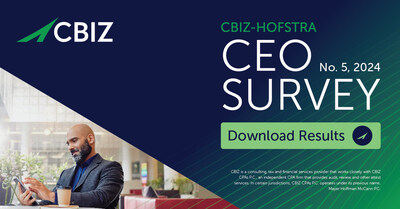Middle-Market CEOs Sound Alarm on Tariff Impacts and Tax Policy Uncertainty
Rhea-AI Summary
The latest CBIZ-Hofstra University CEO Survey reveals significant concerns among middle-market CEOs regarding tariffs and tax policy uncertainty. 53.2% of CEOs express strong concern over tariffs' financial impact, leading to strategic adjustments: 80.9% consider relocating production, 75.4% may reduce workforce, 72.3% plan to delay investments, and 66.4% explore new supplier options.
Regarding tax policies, 42.6% of CEOs reported moderate benefits from the Tax Cuts and Jobs Act, while 51.9% anticipate positive effects from its extension. The Inflation Reduction Act benefited 43.3% of respondents, though 47.7% reported no tangible gains. Economic concerns remain the top issue for 55.1% of CEOs, followed by talent availability (37.5%) and increasing cybersecurity concerns. CEO optimism rebounded to 45.0% in December from 34.5% in September.
Positive
- CEO optimism increased from 34.5% to 45.0% in December
- 42.6% of CEOs reported benefits from Tax Cuts and Jobs Act
- 51.9% anticipate positive effects from TCJA extension
Negative
- 53.2% of CEOs express strong concerns over tariffs' financial impact
- 75.4% of companies may implement workforce reductions
- 72.3% plan to delay investments
- 47.7% reported no tangible gains from Inflation Reduction Act
- 55.1% cite economic concerns as top issue
News Market Reaction – CBZ
On the day this news was published, CBZ gained 2.49%, reflecting a moderate positive market reaction.
Data tracked by StockTitan Argus on the day of publication.
Tariff Concerns Force Strategic Adjustments
Tariffs emerged as a dominant issue, with
80.9% are considering relocating production to mitigate tariff-related costs.75.4% may reduce their workforce.72.3% plan to delay investments.66.4% are exploring new supplier options.50.0% are contemplating price increases.
"Our findings highlight the profound ripple effect that even the discussion of tariffs is having on the middle market, forcing CEOs and management teams to rethink their strategies at every level," said Jerry Grisko, President and Chief Executive Officer of CBIZ. "These economic factors compel businesses to be more agile, re-evaluate their operational frameworks, and seek innovative solutions to maintain resilience and competitiveness. Understanding and anticipating these shifts are crucial for CEOs. "
Mixed Impacts of
The survey also reveals divided perspectives on the benefits of recent and proposed tax reforms:
42.6% of CEOs reported moderate benefits from the Tax Cuts and Jobs Act (TCJA), including reduced corporate tax rates and bonus depreciation.51.9% anticipate positive effects if TCJA provisions are extended, though30.1% expect no impact.43.3% have benefited from the Inflation Reduction Act (IRA), but nearly half (47.7% ) reported no tangible gains.
"While tax reforms have provided relief for many, the overall impact remains uneven across industries," said Bill Smith, National Director of Tax Technical Services at CBIZ. "The survey underscores the complexity of tax-driven economic policies and the need for individually tailored strategies to address them."
Key Takeaways on Business Confidence and Planning
Beyond policy concerns, the survey reveals broader trends influencing CEO decision-making:
- Economic concerns: Consistently the top issue, cited by
55.1% of CEOs. - Talent availability: Ranked among the top three influences by
37.5% , reflecting persistent hiring challenges. - Cybersecurity concerns: Growing in importance, increasing
6.7% since September.
Despite these challenges, optimism among CEOs rebounded in December, with
The survey was developed, conducted, and analyzed by Zarb School MBA students, led by Dr. Andrew Forman, associate professor of international business and marketing, in partnership with CBIZ.
"The data from our latest survey underscores the heightened sensitivity of middle-market CEOs to both tariffs and tax policy uncertainties," shared Dr. Andrew Forman. "As such, businesses are making difficult but necessary decisions to safeguard their profitability and maintain competitiveness."
"Learning to adapt and adjust during uncertain times is an essential lesson for business students," stated Janet A. Lenaghan, Dean of the Zarb School of Business. "Embracing change with a growth mindset empowers leaders to transform challenges into opportunities, drive innovation, solve problems effectively, and strategically position their businesses for long-term success."
About the Survey
The CBIZ-Hofstra Survey is a periodic gauge of mid-market CEOs' outlook and priorities for the next 12 months. The survey polled the leaders of companies with revenues ranging from
About the Frank G. Zarb School of Business at Hofstra University
Hofstra University's Frank G. Zarb School of Business prepares students to become tomorrow's global leaders. Located just 25 miles from
About CBIZ
CBIZ, Inc. (NYSE: CBZ) is a leading professional services advisor to middle market businesses and organizations nationwide. With unmatched industry knowledge and expertise in accounting, tax, advisory, benefits, insurance, and technology, CBIZ delivers forward-thinking insights and actionable solutions to help clients anticipate what's next and discover new ways to accelerate growth. CBIZ has more than 10,000 team members across more than 160 locations in 21 major markets coast to coast. For more information, visit www.cbiz.com.
![]() View original content to download multimedia:https://www.prnewswire.com/news-releases/middle-market-ceos-sound-alarm-on-tariff-impacts-and-tax-policy-uncertainty-302345166.html
View original content to download multimedia:https://www.prnewswire.com/news-releases/middle-market-ceos-sound-alarm-on-tariff-impacts-and-tax-policy-uncertainty-302345166.html
SOURCE CBIZ









